
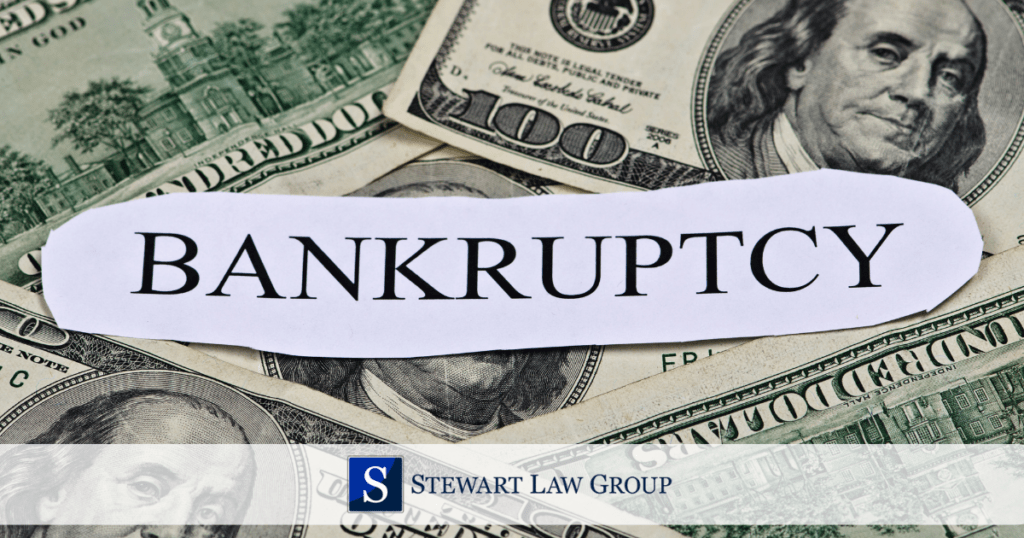
How Bankruptcy Affects Divorce in Arizona
Is it better to declare bankruptcy before or after divorce in Arizona? Well, that depends. Declaring bankruptcy will impact divorce proceedings, primarily the property settlement. And the property division in divorce will directly affect the former spouse’s bankruptcy estate.
Most people file bankruptcy because debt collectors are hounding them or their creditors are suing them. Where the need for debt relief is genuine, people should look to bankruptcy for solutions.
Arizona divorces cross paths with bankruptcy far more often than you might think. Sometimes it’s hard to know which started first, money problems, or marital problems. We know financial pressures weigh heavily on couples. Being in debt can overload a marriage with so much stress it breaks. Did money problems push the spouses toward divorce? Did divorce plus some events combine to thrust a party into bankruptcy? A job loss? Sickness? The need to care for a child at home? As the pandemic years have taught us, anything could happen to anyone at any time.
Divorce Actions May Violate the Automatic Stay
The bankruptcy estate is determined on the date of filing. Actions taken by one or both spouses in the divorce (or leading up to it) could violate the automatic stay. Property transfers occurring within 180 of filing bankruptcy may be included in the bankruptcy estate, even if permitted in the divorce. If spouses sold a second home three months before filing bankruptcy, for example, then the bankruptcy trustee could recover the sale proceeds.
When to File Bankruptcy: Before, During, or After Divorce in AZ
There are several possible scenarios to consider. Divorce could be filed after the bankruptcy discharge or while bankruptcy is pending. Bankruptcy could be filed during divorce proceedings. Or bankruptcy could be filed after the divorce decree.
How current and past-due domestic support obligations (DSOs) are handled will depend on the bankruptcy chapter. Depending on the person’s eligibility, consumer bankruptcy options are filing Chapter 7 (liquidation) or Chapter 13 (wage earner’s plan). In Chapter 7, dischargeable debts are eliminated by court order. Chapter 13 involves reorganizing debt into a multi-year repayment plan, giving the petitioner breathing room under the court’s protection.
Must Spouses File Bankruptcy Together in AZ?
No. Each person decides whether to file for voluntary bankruptcy. Spouses may file bankruptcy jointly, or individually, or one may choose not to file at all. One spouse may file a Chapter 7, for instance, while the other files a Chapter 13. At any time during the marriage (before or during divorce proceedings), you may file bankruptcy, your spouse may file bankruptcy, or both of you may jointly file bankruptcy. Joint petitions are reserved for married spouses.
After the divorce, either individual may file for bankruptcy. You cannot prevent your former spouse from seeking bankruptcy relief and vice versa. But as a creditor entitled to regular support payments, you have rights, too.
Why File Bankruptcy During Divorce in Arizona?
A huge benefit for spouses who file bankruptcy is the automatic stay. The automatic stay protects them from being contacted by debt collectors, getting sued by creditors, having their vehicles repossessed, and more. When a petition is filed in U.S. Bankruptcy Court, the automatic stay puts an immediate stop to all creditor actions. Instead, creditors must present their claims in bankruptcy court.
The automatic stay is essential to preserving the bankruptcy estate, protecting the debtor’s rights, and safeguarding creditors’ interests. The automatic stay remains in effect until the bankruptcy case is closed, or dismissed, or the property at issue is no longer part of the bankruptcy estate.
How Does Bankruptcy’s Automatic Stay Affect Divorce in AZ?
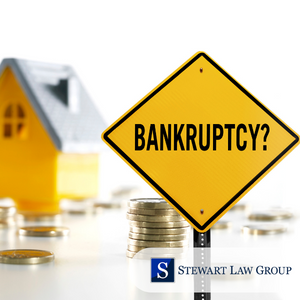 The automatic stay prohibits any attempts at debt collection or self-help against the debtor or debtor’s property without the bankruptcy judge’s permission (typically given in a lift stay order). A creditor, including a former spouse, who violates the automatic stay will face serious penalties.
The automatic stay prohibits any attempts at debt collection or self-help against the debtor or debtor’s property without the bankruptcy judge’s permission (typically given in a lift stay order). A creditor, including a former spouse, who violates the automatic stay will face serious penalties.
Exceptions to the Automatic Stay
What if the spouses are legally separated when the party ordered to pay child support or spousal maintenance declares bankruptcy? Important exceptions to the automatic stay are intended to protect the supported spouse and children.
Certain family law proceedings can continue despite the automatic stay. Proceedings establishing or modifying child support or spousal support orders (DSOs) are not stopped. Family court proceedings that do not directly affect assets and debts in the bankruptcy estate also continue. These proceedings include:
- Paternity establishment
- Child custody or visitation
- Domestic violence
The automatic stay does not stop family court proceedings to collect child support, spousal support, or alimony from property that is not the property of the bankruptcy estate. The debtor’s legal obligation to pay ongoing monthly child support and spousal maintenance (alimony) remains, but there must already be a support order for this exception to apply.
Other exceptions to the automatic stay are:
- Reporting to a consumer credit bureau the overdue support owed by a parent.
- Withholding income that is property of the estate or debtor for payment of a DSO (wage garnishment or attachment of income, for example).
- Civil proceeding to enforce a DSO by withholding, suspending, or restricting a driver’s license, professional license, or recreational license.
- Civil action for dissolution of marriage “except to the extent that such proceeding seeks to determine the division of property that is property of the estate.”
- Civil action to enforce a medical obligation.
- Interception of a tax refund to collect past due support.
(See 11 USC § 362(b)(2).)
Criminal Contempt Proceedings in Family Court
The automatic stay does not stop criminal proceedings. If a parent violated the family law judge’s order by failing to pay child support, then the criminal contempt proceeding to hold that parent accountable can continue while bankruptcy is pending.
Will Your Spouse Be Affected By Your Bankruptcy?
If you are making court-ordered payments to your spouse, then he or she will almost certainly be affected by your bankruptcy. Bankruptcy provides debt relief, but only the bankruptcy petitioner is entitled to that relief. When both spouses file bankruptcy, both may be discharged from joint debts.
TIP: When planning to divorce or in a pending divorce, the way to discharge joint and marital debts is for both spouses to file bankruptcy. Spouses may file bankruptcy jointly or separately, but both need to file.
Bankruptcy Court Involvement in the Arizona Divorce
In Arizona, the Superior Court is the only place to go for divorce. No municipal court, no city court, and no justice of the peace has the authority to grant a divorce or determine child custody.
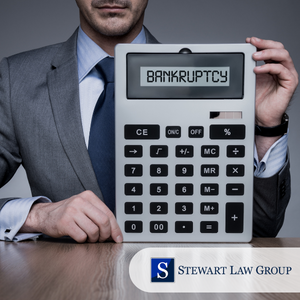 Likewise, no state court has the power to grant a bankruptcy discharge. U.S. Bankruptcy Court is a federal court with jurisdiction over all bankruptcies. Although the bankruptcy court cannot grant a divorce, it has reason to be involved in marital dissolution proceedings because the property of the bankruptcy estate is divided between the divorcing parties.
Likewise, no state court has the power to grant a bankruptcy discharge. U.S. Bankruptcy Court is a federal court with jurisdiction over all bankruptcies. Although the bankruptcy court cannot grant a divorce, it has reason to be involved in marital dissolution proceedings because the property of the bankruptcy estate is divided between the divorcing parties.
Do not be overly concerned about filing for bankruptcy in Arizona while your divorce is pending in another state, such as California. Both cases proceed normally, one in federal court, the other in state court.
If bankruptcy is filed while a divorce is pending or divorce is filed while bankruptcy is pending, then the bankruptcy court will exercise jurisdiction over the property until the bankruptcy case is closed. Then, the remaining distribution of property, if any, will return to the divorce court. Who will be awarded which asset or debt? How will the property be characterized, valued, and divided? When property division is complicated by substantial assets, you can be sure the bankruptcy trustee will be digging into the details so that creditors are not fleeced.
TIP: In your divorce, make sure every asset and debt is categorized as separate property or community property. Make sure each item is properly valued, even if this means hiring an appraiser or forensic accountant. Take pains to ensure there are no loose ends to your property settlement.
Chapter 7 Discharge Followed by Divorce
When Is It Better to File for Bankruptcy Before Divorce?
Some spouses benefit from filing Chapter 7 bankruptcy before filing for divorce. Again, everything depends on their circumstances. For instance, a working couple with no minor children (and no need for spousal maintenance or child support orders), may obtain a reasonably swift Chapter 7 discharge. When divorce is filed post-discharge, their debts should be minimal. The property settlement in the divorce decree would include all exempt property in bankruptcy. After the divorce, both parties can move forward with their new lives, be financially independent, and be free to marry other people.
Divorces in Arizona rarely close in less than six months and, with the cooling-off period, never earlier than 60 days. Realistically, most divorces take at least 12 to 18 months for a decree. This means a Chapter 13 bankruptcy will likely continue for years after the divorce decree. The Chapter 7 bankruptcy discharge could arrive four months after filing in federal court, but the divorce property settlement may delay that.
Bankruptcy Filed During Pending Divorce
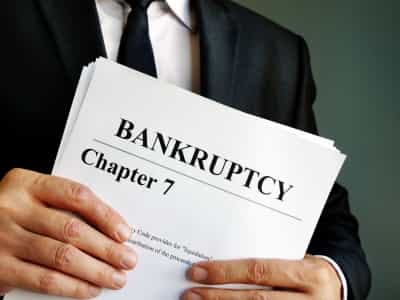 Can You Get a Divorce While in Chapter 7 in Arizona?
Can You Get a Divorce While in Chapter 7 in Arizona?
Yes, the two cases can proceed simultaneously. Many spouses benefit from filing Chapter 7 while a divorce is pending but before their property settlement is finalized by the family law judge. Once separated, each spouse typically experiences decreased household income with increased living expenses. When they have minor children, those monthly expenses could be substantial. Bankruptcy protection can help.
What Happens to Divorce Proceedings?
The bankruptcy automatic stay will not stop the divorce from going forward but will halt divorce proceedings to divide the property. Because the debtor’s property is part of the bankruptcy estate, the family court cannot negatively impact the debtor’s creditors. Consequently, the division of property – who gets which asset and who pays which debt – cannot proceed in family court until the bankruptcy court allows it. This is important because any sale, division, or transfer of non-exempt property in the divorce may be set aside by the bankruptcy trustee if a judicial lift stay order was not obtained first.
The bankruptcy court will determine when the property division can proceed in family court. How long a delay will depend, in part, on whether it is a Chapter 7 or Chapter 13 case. When the bankruptcy court lifts the stay to allow the divorce to continue, the next step is getting back on the family law judge’s docket. Expect a delay!
TIP: The division of property in a divorce cannot proceed without the bankruptcy judge lifting the automatic stay order on transfers involving specified assets and debts. File a lift-stay motion with your bankruptcy lawyer’s assistance.
Divorce Filed Before Bankruptcy in Arizona
When Is It Best to File for Divorce Before Bankruptcy in Arizona?
With the property settlement in the divorce decree, either former spouse may then file Chapter 7. Because DSOs are non-dischargeable, filing Chapter 7 is not an escape valve for the support obligor. Bankruptcy could help reduce or eliminate other debts, however, making those DSOs easier to pay.
TIP: Filing a Chapter 13 bankruptcy after the divorce allows the debtor to include DSOs with other debts on a monthly payment plan.
What About Child Support Arrearages or Past Due Spousal Maintenance?
In Chapter 7 bankruptcy, child support arrearages can be collected by the support creditor – that is, the other parent, child support enforcement agency, or former spouse.
Chapter 7 will not change the debtor’s family support obligations. But as a practical matter, when other debts are discharged more resources are freed to pay DSOs. Either party could seek modified orders for changed circumstances. The obligor may ask the family court to lower monthly support payments. The supported party may argue that, after the bankruptcy discharge, the obligor should pay more support each month.
Talk to a family law attorney about seeking modified support orders. You can do this while the bankruptcy case is pending. Family court proceedings to modify support orders are not stopped by the automatic stay in bankruptcy.
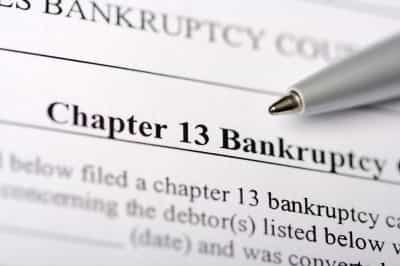 Can You Get a Divorce While in Chapter 13 Bankruptcy in Arizona?
Can You Get a Divorce While in Chapter 13 Bankruptcy in Arizona?
Yes, people do file for divorce in Chapter 13. When spouses file a joint bankruptcy petition, their divorce may be a reason to modify the repayment plan or bifurcate the case to split it or convert Chapter 13 into Chapter 7.
In Chapter 13, debts are paid according to a court-approved 3-year to 5-year repayment plan which is followed by a discharge order (again, DSOs are not dischargeable). The Chapter 13 plan includes ongoing monthly child support and support arrearages.
The Chapter 13 plan provides a monthly budget to pay current child support and spousal support, satisfy support arrearages, and pay other creditors. So long as the debtor complies with the plan, bankruptcy provides protection from civil actions to collect on the DSO and DSO arrears. What if the debtor doesn’t comply with the plan? The DSO creditor can ask the bankruptcy judge to allow an action in family court to collect the arrears.
TIP: Divide the total support arrears into 12 installment payments and include the monthly amount as part of your Chapter 13 repayment plan.
Bankruptcy Filed After Divorce Decree in Arizona
Can I declare bankruptcy after the divorce?
Yes. But have a legal strategy before you file.
Can Any Debt in the Divorce Decree Be Discharged?
Could the divorce debt be a DSO in disguise? Could a legal argument be made that the debts a former spouse was ordered to pay by divorce decree are actually part of a DSO? Or that a standard property settlement is actually part of the DSO because it allows the supported party to keep more of his or her own money for living expenses? Because domestic support obligations are non-dischargeable debts, it is important the divorce decree clearly label orders as “child support,” “spousal support,” “separation agreement,” and so on. If bankruptcy is filed, then the former spouse can show the bankruptcy trustee that the money owed is (or is not) a DSO.
Does Bankruptcy Clear Divorce Debt?
Unsecured claims that your spouse was ordered to pay in the divorce decree, such as credit card bills or medical bills, are typically discharged in his or her Chapter 7 bankruptcy. Did your ex-spouse file Chapter 13? Consult an attorney about protecting your creditor rights and preserving the debt-paying obligations in the divorce decree.
What happens with secured debts?
This can get complicated very quickly, especially when the secured creditor is a mortgage lender.
Were you awarded the house and was the other party ordered to pay the mortgage? Unless the mortgage payment is actually, provably a DSO that cannot be discharged, you could be in a vulnerable position if your former spouse files bankruptcy.
TIP: So you don’t have to worry about your former spouse defaulting on the mortgage and ruining your financial security, refinance as soon after the divorce as possible. Be mindful, that you still have to qualify for any new loan.
Final Tip for Bankruptcy & Divorce in Arizona
We saved our best tip for last. To protect your position on issues raised in divorce and bankruptcy – no matter who filed what or when – coordinate your Arizona family law attorney with your bankruptcy lawyer on all important proceedings.